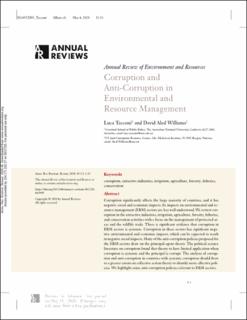Corruption and Anti-Corruption in Environmental and Resource Management
Journal article, Peer reviewed
Permanent lenke
https://hdl.handle.net/11250/2677131Utgivelsesdato
2020-10-01Metadata
Vis full innførselSamlinger
- Publications [1488]
Originalversjon
in Annual Review of Environment and Resources vol. 45 pp. 305-329 10.1146/annurev-environ-012320-08310.1146/annurev-environ-012320-083
Sammendrag
Corruption significantly affects the large majority of countries, and it has negative social and economic impacts. Its impacts on environmental and resource management (ERM) sectors are less well understood. We review corruption in the extractive industries, irrigation, agriculture, forestry, fisheries, and conservation activities with a focus on the management of protected areas and the wildlife trade. There is significant evidence that corruption in ERM sectors is systemic. Corruption in these sectors has significant negative environmental and economic impacts, which can be expected to result in negative social impacts. Many of the anti-corruption policies proposed for the ERM sectors draw on the principal-agent theory. The political science literature on corruption found that theory to have limited application when corruption is systemic and the principal is corrupt. The analysis of corruption and anti-corruption in countries with systemic corruption should draw to a greater extent on collective action theory to identify more effective policies. We highlight some anti-corruption policies relevant to ERM sectors.
Serie
Annual Review of Environment and Resources vol. 45Annual Review of Environment and Resources vol. 45
